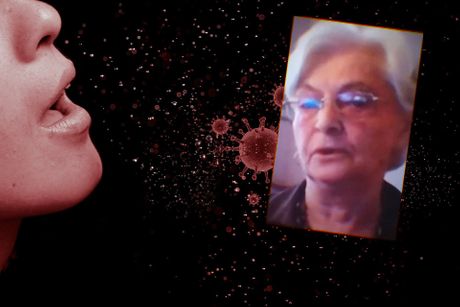Dr. Ana Gligic, who fought a smallpox epidemic in 1972, warns: "Yes, virus can be inhaled"

Dr. Ana Gligic, a retired virologist, the woman who was the head of a laboratory at the time of the smallpox epidemic in Belgrade in 1972 and has researched the even more dangerous Marburg virus, doesn't hide that she is surprised by everything that has been going on in recent months around the spread of coronavirus across the globe.
"I'm surprised with what is happening, I couldn't even imagine that this virus would conquer the entire planet in three months," she told TV Prva, Blic is reporting.
According to her, "the virus probably had two paths in reaching the human population, acquiring its invasiveness in two ways."
"The first possible path is the transformation of an existing virus in nature, which was waiting there for years, and through natural selection changes in the genome occurred, and it became very virulent. This is why the first cases when it switched to humans were much more invasive than they are now. Another possible path is that the virus jumped species transferring from the host to humans when the ecological balance was disturbed. Many viruses from natural hotpots are known to change their virulence by jumping over the barrier, becoming more virulent for the new host. For us, this second variant is better, God forbid that this came by natural selection, it would mean it could do it each year," says Dr. Gligic.
According to her, it is imperative that virologists take matters into their own hands and examine all the strains.
"It's important to pick strains from across the planet, to compare them. There is research according to which all coronavirus samples from this epidemic are divided into three groups. The first are all strains from China, the second are those from Bulgaria and Kenya, which are related to each other, and the third are all strains from other countries, 18 of them, including the US, Russia, France... Spain did not send (samples) for the research," explained Dr. Ana Gligic.
She doesn't hide that some things seem pretty strange to her.
"I find it very strange that there are intermediate transmitters, now I find it even more strange that all this disinfecting is being done, there is obviously suspicion that the virus stays outdoors for a long time. Walls, streets are being disinfected... Obviously, some information is not being communicated so as not to unnecessarily confuse the public."
She also finds it strange that the virus spreads so easily.
"I don't have my own experience, but given my experience with other infections, I cannot interpret this as just contact spread. The hosts in nature are bats, which has been proven. I don't know if the bats in our country are infected? Can the virus be conserved when it's released through feces or urine?"
The doctor thinks that our country is so far combating the virus well, which is, as she says, "an economic and a scientific problem."
"It'll cost the world of huge amount of money. I expect the vaccine to be made soon. Scientists are exchanging their strains, but they need to study it well, to choose a strain. There are three groups that differ in the genome. However, it will not require three vaccines but a three-type vaccine."
She advises citizens to pay attention to minor things.
"Foreign researchers in our country, but also in Italy, research everything from the air to the ground. Outdoors the virus lingers longer on metal sufaces, such as a door handle. It can stay there for a few hours. What does that means? Anyone who touches the handle and brings their hand to their nose can breathe in the virus and become infected. Yes, you can inhale the virus," she concluded.
Video: The first microscopic images of coronavirus
(Telegraf.rs)
Video: Porfirije: Sazvežđe srpskih mučenika rasuto je po svim krajevima naše zemaljske postojbine
Telegraf.rs zadržava sva prava nad sadržajem. Za preuzimanje sadržaja pogledajte uputstva na stranici Uslovi korišćenja.

